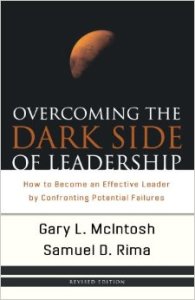Headlines announce the news of the failure of another Christian leader with depressing frequency. Just as sobering is the steady stream of pastors who leave the ministry, never to return, due to moral failures, burnout, or frustration with the pressures of the job. And many pastors faithfully carry on in their churches for years, but never truly thrive.
Pastors Samuel Rima and Gary McIntosh wrote their book, Overcoming the Dark Side of Leadership, because they wanted to address these problems by helping pastors and other leaders to face their own issues in order to flourish in ministry.
In Overcoming the Dark Side of Leadership: The Paradox of Personal Dysfunction, Rima and McIntosh clearly delineate what they call “the paradox of personal dysfunction in leadership” — the fact that:
The personal characteristics that drive individuals to succeed and lead often have a shadow side that can cripple them once they become leaders and very often causes significant failure.
They cite instances of leaders who were driven to achieve in attempts to gain parental approval, for example, but who then found that same drive became a destructive force of compulsive workaholism or perfectionism that destroyed their relationships.
In Part 2 of the book, the authors specify various forms a leader’s dark side might take: compulsive, narcissistic, paranoid, codependent and passive-aggressive. They describe these in laymen’s terms, rather than from a clinical perspective, but their observations are sound and applicable. Each of these chapters ends with a short, helpful questionnaire for self-evaluation.
The authors’ recommendations for leaders found in Part 3, “Redeeming Our Dark Side,” are wise and practical. They emphasize that is is crucial for leaders to grow in their own self-knowledge and in their understanding of their identity in Christ.
One of the helpful appendices gives an example of an annual performance evaluation of a senior pastor by a church board, a practice recommended by the authors. They state:
Though opening oneself to formal evaluation is always a risky and frightening experience, it is well worth the risk and fear it engenders… It is always painful to acknowledge our failures and problems but it is absolutely essential if we are ever to gain control of our dark side.
Reading this book inspired personal self-reflection. My tendencies toward codependency — the way I take care of others, my desire to keep the peace — are part of what drew me toward ministry and toward becoming a therapist. Left unchecked, however, these tendencies damage my effectiveness. They make it difficult for me to say no, keep me silent when I need to speak up, and hinder my effective self-care, making me vulnerable to fatigue and burnout.
It was good to be reminded that even though focusing on people-pleasing helped me to get some of my attachment needs met as a child, I can leave that behind now. When I know who I am in Christ — that I am loved, that I am valuable — then my attachment needs are met and I can give to other people out of abundance, leading in a healthy way rather than a codependent way.
The book also increased my insight into ways that other pastors I have known have been affected by their dark sides. The descriptions of narcissistic leaders and compulsive leaders were sadly familiar. My heart goes out to Christian leaders who want to serve God and do not realize how much their own shadow side is negatively impacting their ministries. May they read this book and be helped.
Question: What do you think? What helps you most as a leader to keep your personal issues — your “dark side” — from negatively impacting your ministry? You can leave a comment by clicking here.


Please note: I reserve the right to delete comments that are offensive or off-topic.